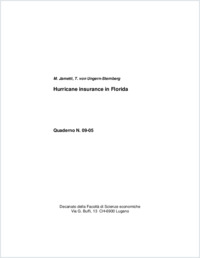Hurricane insurance in Florida
- Jametti, Mario Istituto microeconomia e economia pubblica (MecoP), Facoltà di scienze economiche, Università della Svizzera italiana, Svizzera
- Ungern-Sternberg, Thomas von Faculty of Business and Economics, University of Lausanne, Switzerland
-
2009
17 p
English
This paper studies the evolution of hurricane insurance in Florida over the last decades. Hurricanes (and other natural catastrophes) are typically referred to as “uninsurable” risks. The more exposed property owners find it difficult to obtain insurance cover from the private market and/or can do so only at premiums that substantially exceed their expected claims costs. The state of Florida has reacted to the incapacity of the private sector to insure hurricane risks at reasonable premium levels with the creation of Citizens Property Insurance Corporation (an insurer of last resort) and the Florida Hurricane Catastrophe Fund. Their existence has resulted in substantial premium reductions for the Florida property owners. Both institutions have the possibility of spreading the costs of a major hurricane over a (very) large number of policy holders through after the event compulsory assessments. The risk borne by each individual property owner is thus reasonably small, with substantial benefits for consumers as a group. Looking forward the challenge to the policy maker will be to fine-tune the operation (premium structure) of these two institutions so as to increase their political acceptance. To this end it will be necessary to limit the implicit subsidy of the “bad risks” through the “good risks”.
- Language
-
- English
- Classification
- Economics
- License
-
License undefined
- Open access status
- green
- Identifiers
-
- RERO DOC 12492
- ARK ark:/12658/srd1318127
- Persistent URL
- https://n2t.net/ark:/12658/srd1318127
Statistics
Document views: 191
File downloads:
- Texte intégral: 286
